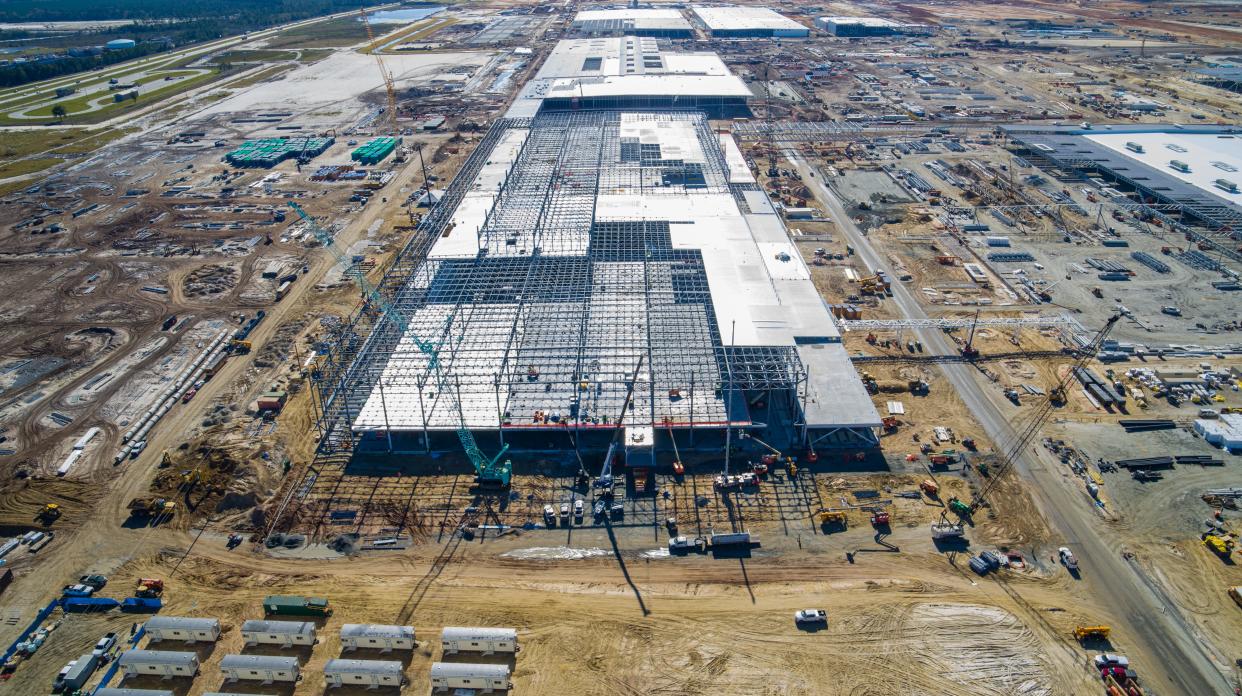Hyundai's 'virtual' solar for Georgia plant reflects 'backward process,' critics say

Hyundai Motor Group plans to “support sustainable manufacturing” at its $7.6 billion Georgia electric-vehicle plant and related manufacturing facilities in the state by buying enough solar power annually to electrify 31,000 typical American homes for a year.
The South Korean automaker’s announcement of a deal with a Spanish energy developer also illustrates the shell game some companies play to meet climate-related goals, and the roadblocks they face from monopoly utilities that supply their power.
In this case, the 378 gigawatt hours of electricity the Hyundai committed to buy annually won’t actually flow the more than 1,000 miles between the Stillhouse Solar Project in Bell County, Texas, to automaker’s EV factory in Bryan County.
That’s because Texas has a self-contained energy grid while Georgia is part of what is known as the Eastern Interconnection, which covers most of the Southeast, explained Maggie Shober, research director at the Southern Alliance for Clean Energy.
“It would be a pretty big and expensive undertaking to pay for the transmission path to get that solar to Georgia,” she added.
Instead, Hyundai will accumulate “renewable energy credits” for its share of the electricity produced over the course of the 15-year agreement through a so-called virtual power purchase agreement, company spokeswoman Dain Kang confirmed this week.
So, while it can’t use the power, Hyundai will sell the electricity to a utility or other provider on the Texas grid. According to Shober, that arrangement illustrates a “hierarchy” in the corporate pursuit of energy goals.
“The best (scenario) would be projects on-site, or at least in the same service territory and state, if applicable,” she explained. “Those are going to most directly offset the company's load.”
In Hyundai’s case, Shober added, the company must ensure its outside purchase of energy doesn’t make Georgia Power’s generation mix “dirtier.”
“It doesn't appear to me that Hyundai is considering any increases in emissions in Georgia Power due to its load when announcing that this project will decrease emissions,” she noted.
'Fast and furious': Savannah-area job seekers vie for 3,500 openings with Hyundai
However, Georgia Power is responding to projected increased electricity demand from a flood of new manufacturing facilities, including Hyundai, and energy-intensive data centers with three new gas-fired power plants recently approved by the state Public Services Commission.
The combined capacity of the units will be as much as 1,400 megawatts.
New federal emissions guidelines finalized this week will require new gas-fired power plants to “capture” 90% of carbon emissions. But utilities aren’t required to fully employ the still-evolving technology until 2032.
Meanwhile, Hyundai’s share of the Stillhouse Solar Project will prevent an estimated 140 tons of heat-trapping carbon dioxide from entering the atmosphere in Texas annually, the company said. That’s the equivalent of what 84,000 typical American cars release into the atmosphere in one year.
“The fact that Hyundai is buying clean energy from the other side of the country shows how backward and inequitable the process is,” said Codi Norred, executive director of Georgia Interfaith Power and Light. “Georgia Power gets to burn more fossil fuels, Hyundai gets to call their energy ‘clean,’ and Georgians get filthier air and potentially higher bills.”
'The volitivity of fossil fuels'
Without impacting Hyundai’s actual energy mix, the Texas solar deal will allow the automaker – which has pledged to reach “net-zero” in climate-impacting pollution by 2045 – to shrink its emissions footprint by purchasing the “virtual” credits.
That’s particularly significant in Georgia, where 60% of the state’s energy is still produced by burning fossil fuels. The imbalance makes limiting energy-related emissions a challenge for companies like Hyundai, which buys electricity from Georgia Power.
But critics of Hyundai’s recruitment suggest the state should have demanded large-scale in-state solar investment in exchange for Georgia’s largest-ever incentive package.
“Georgia gave Hyundai $2 billion in tax abatements rather than asking them to invest in our community infrastructure,” said Jen Hilburn, north coast advocate for the organization One Hundred Miles. “Now, Georgia’s lack of investment in renewable energy has Hyundai spending money elsewhere to meet their commitment to clean energy.”
Where will they live? SEDA, Georgia Tech team up for housing study amid population growth
Hyundai is installing a solar array on a rooftop over a covered parking lot on its campus, but the panels will supply just a fraction of the plant's electricity.
Norred noted that heavy energy users including Walmart and Google asked the Public Service Commission to reject Georgia Power’s request for more natural gas capacity, as did the U.S. Department of Defense.
He added that of the utility’s four rate hikes since the beginning of last year, the largest – leading to a nearly $16 spike in the average Georgia Power residential customers monthly bill – was tied to soaring fuel prices in 2022.
“That speaks to the volatility of fossil fuels like gas and coal,” Norred said.
Two more rate increases have been approved for the next eight months. Combined, the hikes will add $44 a month to the average residential bill.
The sun, meanwhile, is not a commodity subject to market whims. Rather, the cost of solar is borne primarily up front with the purchase and installation of systems.
In this case, Spain-based Matrix Renewables bought the Texas project from developer OCI Solar Power. Hyundai will purchase 70% of the facility’s capacity, the company said.
John Deem covers climate change and the environment in coastal Georgia. He can be reached at jdeem@gannett.com
This article originally appeared on Savannah Morning News: Hyundai taps Texas for solar power 'credit' at Georgia EV facility

